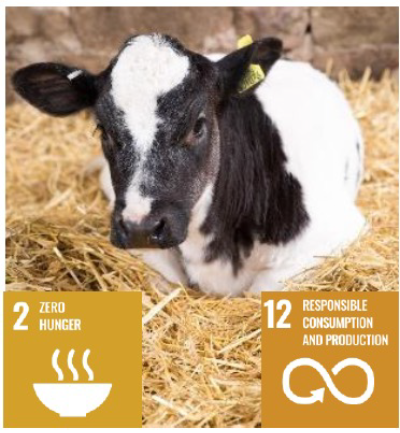Facts:
The project runs from December 2023 - December 2025 and is financed by the research council Formas.

The project aims to evaluate the welfare of pre-weaned dairy calves housed outdoors in winter using treated reed canary grass as bedding.
Animal welfare is not just an ethical responsibility but also a legal one for farmers, and it plays a crucial role in the sustainability of livestock systems. In Scandinavia, particularly due to the harsh winters, it is a common practice to keep calves indoors. However, this indoor housing is often linked to an increased occurrence of respiratory and other diseases among calves, which negatively impacts their welfare.
While low temperatures pose a risk to calves, it is feasible and actually beneficial to house them outdoors if they are provided with an enriched environment that includes dry and high-quality deep bedding. Traditionally, farmers use straw from wheat, barley, and oats as bedding material. However, in northern Sweden, this straw is scarce, presenting a significant challenge to outdoor calf housing during winter.
To address this issue, researchers are exploring alternative bedding materials. One promising candidate is a new commercial product made from reed canary grass (RCG). This product is shredded, heat-treated, and pressed into briquettes. Though it is currently used as fertilizer and for biogas production, it has not yet been tested as a bedding material.
The upcoming project aims to evaluate the welfare of pre-weaned dairy calves housed outdoors in winter using this treated RCG as bedding. Researchers will compare these conditions to both indoor and outdoor housing scenarios, regardless of the bedding material used. This cross-disciplinary study will run from December 2023 to November 2025, aiming to find a sustainable solution that supports both animal welfare and the practical needs of farmers in the challenging Scandinavian climate.
By exploring these innovative solutions, the project hopes to enhance the sustainability of livestock systems while ensuring that the welfare of the animals is prioritized.
The trial will take place from October 2024 to March 2025. If you are interested about the research, please, contact the team.
Juana Chagas, Researcher, THV, SLU, Sweden, juana.chagas@slu.se
Knut-Håkan Jeppsson, IBT, SLU, Sweden
Evelina Viklund, Växa Sverige, Sweden
Marcos Marcondes, Washington State University, USA
Emma Ternman, Nord University, Norway

The project runs from December 2023 - December 2025 and is financed by the research council Formas.